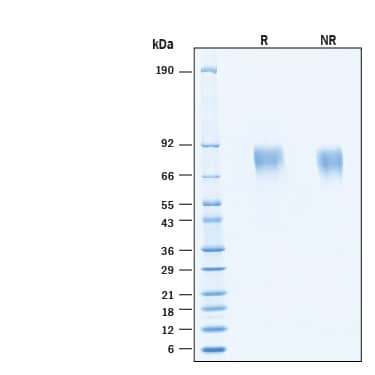Recombinant Human Guanylyl Cyclase C His Avi-tag Protein, CF
R&D Systems, part of Bio-Techne | Catalog # AVI2157
Biotinylated /GUCY2C His-tag

Key Product Details
Learn more about Avi-tag Biotinylated Proteins
Source
HEK293
Accession #
Structure / Form
Biotinylated via Avi-tag
Conjugate
Biotin
Applications
Bioactivity
Product Specifications
Source
Human embryonic kidney cell, HEK293-derived human Guanylyl Cyclase C/GUCY2C protein
| Human Guanylyl Cyclase C Protein (Ser24-Gln430) Accession # P25092.2 |
6-His tag | Avi-tag |
| N-terminus | C-terminus |
Purity
>95%, by SDS-PAGE visualized with Silver Staining and quantitative densitometry by Coomassie® Blue Staining.
Endotoxin Level
<0.10 EU per 1 μg of the protein by the LAL method.
N-terminal Sequence Analysis
Ser24
Predicted Molecular Mass
49 kDa
SDS-PAGE
75-85 kDa, under reducing conditions.
Activity
Measured by its binding ability in a functional ELISA.
When Human Guanylyl Cyclase C Antibody (Catalog # MAB2157) is immobilized at 100 ng/mL (100 µL/well), Biotinylated Recombinant Human Guanylyl Cyclase C His-tag Avi-tag binds with an ED50 of 0.250-1.50 ng/mL.
Measured by its ability to inhibit neurite outgrowth of E16-E18 rat embryonic cortical neurons.
2.50 μg/mL of protein is able to significantly inhibit neurite outgrowth.
When Human Guanylyl Cyclase C Antibody (Catalog # MAB2157) is immobilized at 100 ng/mL (100 µL/well), Biotinylated Recombinant Human Guanylyl Cyclase C His-tag Avi-tag binds with an ED50 of 0.250-1.50 ng/mL.
Measured by its ability to inhibit neurite outgrowth of E16-E18 rat embryonic cortical neurons.
2.50 μg/mL of protein is able to significantly inhibit neurite outgrowth.
Scientific Data Images for Recombinant Human Guanylyl Cyclase C His Avi-tag Protein, CF
Biotinylated Recombinant Human Guanylyl Cyclase C/GUCY2C His-tag Avi-tag Protein Binding Activity.
Biotinylated Recombinant Human Guanylyl Cyclase C Fc Chimera Avi-tag (AVI10575) OR His-tag Avi-tag (Catalog # AVI2157) binds to Human Guanylyl Cyclase C Antibody (MAB2157) with an ED50 of [AVI10575, 0.500-3.00 ng/mL, AVI2157, 0.250-1.50 ng/mL]Biotinylated Recombinant Human Guanylyl Cyclase C/GUCY2C His-tag Avi-tag Protein SDS-PAGE.
2 μg/lane of Biotinylated Recombinant Human Guanylyl Cyclase C/GUCY2C His-tag Avi-tag Protein (Catalog # AVI2157) was resolved with SDS-PAGE under reducing (R) and non-reducing (NR) conditions and visualized by Coomassie® Blue staining, showing bands at 75-85 kDa.Formulation, Preparation and Storage
AVI2157
| Formulation | Lyophilized from a 0.2 μm filtered solution in PBS with Trehalose. |
| Reconstitution | Reconstitute at 500 µg/mL in PBS. |
| Shipping | The product is shipped at ambient temperature. Upon receipt, store it immediately at the temperature recommended below. |
| Stability & Storage | Use a manual defrost freezer and avoid repeated freeze-thaw cycles.
|
Background: Guanylyl Cyclase C/GUCY2C
References
- Arshad, N. and Visweswariah S.S. (2012) FEBS Lett. 586:2835.
- Potter, L.R. (2011) Cell Signal (2011) 23:1921.
- Arshad, N. et al. (2013) J. Biol. Chem. 288:3907.
- Gibbons, A.V. et al. (2013) Cancer Res. 73:22.
- Lucas, K. et al. (2000) Pharmacol Rev. 52:375.
- Gong, R. et al. (2011) Science 333:1642.
- Waldman, S.A and Camilleri, M. (2018) Gut 67:1543.
- Kim, G.W. et al. (2013) Trends Endocrinol Metab 24(4):165.
Alternate Names
DIAR6, GC-C, GCC, Guanylate Cyclase C, GUC2C, GUCY2C, MUCIL, STA Receptor, StAR
Gene Symbol
GUCY2C
UniProt
Additional Guanylyl Cyclase C/GUCY2C Products
Product Documents for Recombinant Human Guanylyl Cyclase C His Avi-tag Protein, CF
Product Specific Notices for Recombinant Human Guanylyl Cyclase C His Avi-tag Protein, CF
For research use only
